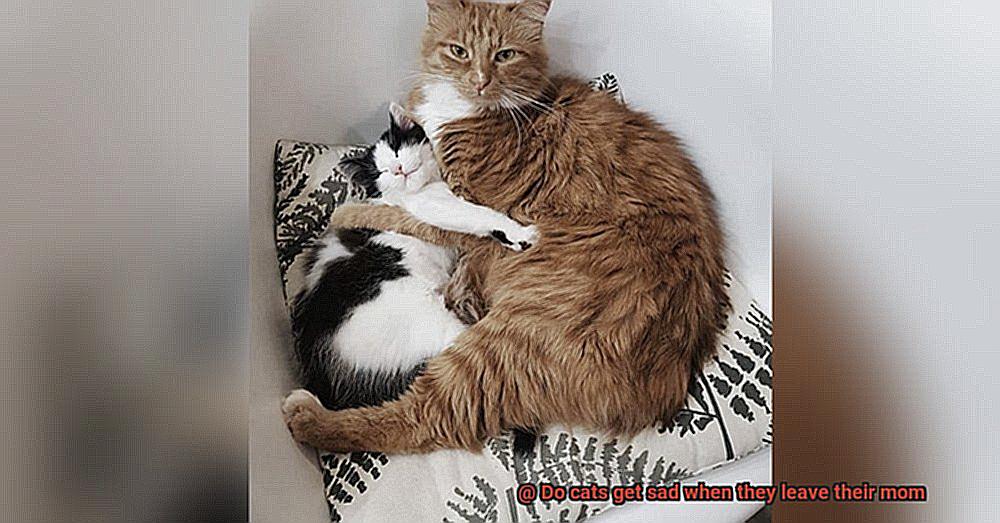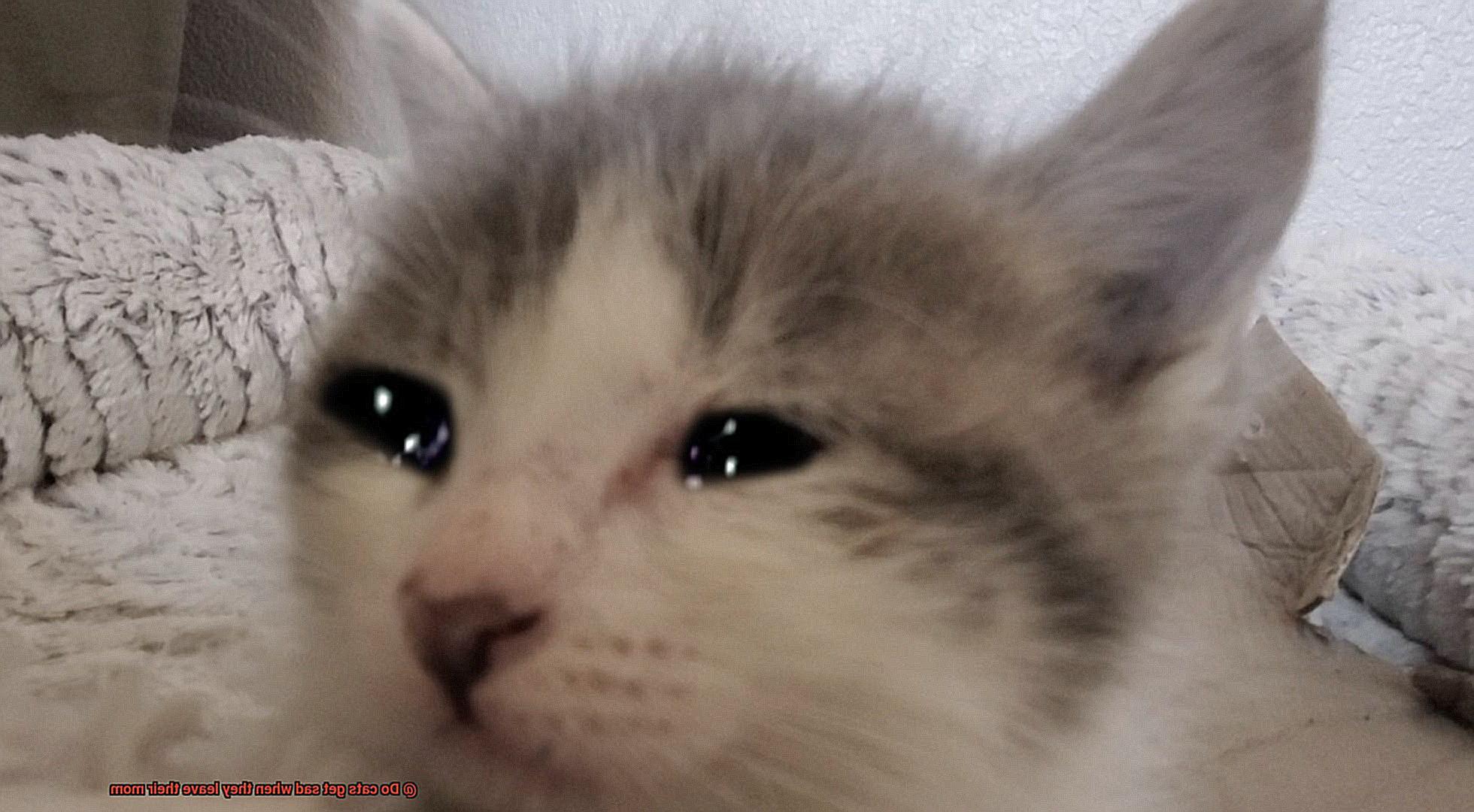There’s no denying the irresistible charm of a litter of kittens. Their tiny paws, soft fur, and playful antics are enough to melt even the coldest of hearts. But what happens when it’s time for them to leave their mother and find new homes? Do cats experience sadness when they’re separated from their mom?
As a devoted cat lover, this question has been on my mind for quite some time. After conducting extensive research and closely observing feline behavior, I’ve come to the conclusion that yes, cats do feel a sense of loss and anxiety when they’re taken away from the familiar comforts of their mother and littermates.
But what does this look like in practice? How does it impact their physical and emotional wellbeing? And most importantly, how can we as pet owners ensure that our furry friends make a smooth transition into their new surroundings?
In this blog post, we’ll delve deep into these questions and explore the fascinating world of feline emotions. Whether you’re a seasoned cat owner or just starting out with your first furry companion, there’s plenty to learn about why cats get sad when they leave their mom – and how we can help them adjust to life in their new home.
So, let’s dive in.
What Makes Cats Social Creatures?
As someone who has studied cats and their social behaviors extensively, I can confidently say that these creatures are anything but solitary.
Despite the common misconception that cats prefer to be alone, they actually crave attention and companionship just as much as any other pet.
In fact, socialization is crucial to their overall well-being.
From the moment they are born, kittens rely on their mothers and littermates for socialization and learning important skills such as hunting and grooming. If a kitten is separated from its mother too early, it can lead to behavioral problems and emotional distress.
Therefore, it’s essential to understand the importance of early socialization and provide a nurturing environment for young cats.

But what exactly makes cats such social creatures? One factor is their need for affection and attention. Cats crave physical contact with their owners and other feline companions. They also communicate with each other through vocalizations, body language, and scent marking. This social interaction helps to establish hierarchy within a group of cats and creates a sense of security and belonging.

Another key factor is their territorial nature. Cats mark their territory with urine and other scents to communicate their presence to other cats. They also use their sense of smell to recognize familiar individuals and identify potential threats. While this territorial behavior can sometimes lead to aggression towards unfamiliar cats, it also helps create a sense of community among feline companions.
It’s important to note that not all cats will display signs of sadness or emotional distress when separated from their mothers. Some may adjust quickly and form strong bonds with their new family members. However, others may exhibit signs of anxiety, fear or depression such as excessive meowing, loss of appetite or hiding behavior.
The Impact of Age on Separation-Related Emotional Distress
The answer is not straightforward, as each cat is unique and may respond differently to separation from their mother. However, research suggests that younger kittens may experience more distress than older cats.
Kittens are still developing their social skills and rely heavily on their mother for comfort and security. When separated from their mother at a young age, they can become anxious or aggressive, leading to behavioral problems. This is why it is crucial for kitten owners to provide a supportive and nurturing environment during this critical period of development.
It’s not just the age of the cat that matters; the length of time they spend with their mother can also impact their emotional response to separation. Cats who have had longer periods of socialization with their mother and littermates may be better equipped to handle separation and adjust more quickly to new environments.
As responsible cat owners, we must provide our furry friends with plenty of attention, comfort, and familiar objects such as blankets or toys to help ease any potential emotional distress during times of transition or change. By understanding the unique needs of our feline companions, we can ensure they receive the care and support they need to thrive.
The Influence of Circumstances on Cat’s Emotional State
While cats may not experience emotions in the same way humans do, they are still capable of feeling stress and anxiety.
One of the most crucial stages for a kitten is the period when they are with their mother and littermates. During this time, they develop important socialization skills and learn how to interact with other cats. If a kitten is separated from their mother before 8-12 weeks old, they may have difficulty adjusting to new environments and social situations later in life.
However, even if your kitten is separated at the appropriate age, the circumstances surrounding the separation can still affect their emotional state. For example, if your kitten is taken away abruptly without any familiar objects or people, they may feel stressed and anxious. This can lead to behavioral issues such as excessive meowing or hiding.
On the other hand, by gradually introducing your kitten to new surroundings and providing comforting items such as blankets or toys, you can help them feel more secure and confident in their new environment. This can make a significant difference in their emotional wellbeing.
So, it’s important to take steps to ensure your furry friend has the best possible start in life. Try to wait until your kitten is at least 8-12 weeks old before separating them from their mother. When you do bring them home, provide plenty of attention and affection while gradually introducing them to new surroundings.
Signs of Anxiety, Fear, or Depression in Cats
When a cat is separated from its mother, it can lead to anxiety, fear, and depression. As responsible pet owners, it’s essential to be aware of the signs that indicate distress in our cats.
Excessive grooming is one of the most common signs of anxiety in cats. If you notice your cat licking or biting itself excessively, it may be a sign that they are feeling anxious. Other signs of anxiety include hiding, vocalizing excessively, and avoiding social interaction.
Fear in cats can manifest in various ways, such as cowering or hiding when approached by humans or other animals. Cats may also exhibit trembling or shaking when they’re scared. Additionally, they may become more aggressive towards their surroundings or people around them.
Depression in cats is not as easily noticeable as anxiety or fear, but it can lead to significant health issues if left untreated. Depressed cats may experience a lack of appetite or interest in activities they previously enjoyed. They may also sleep more than usual and show little interest in social interactions.
It’s important to note that the signs of anxiety, fear, or depression may not always be apparent in cats. However, if you notice any changes in your cat’s behavior after being separated from its mother, it’s crucial to seek veterinary advice promptly.
Not All Cats Show Signs of Distress When Separated From Their Mothers
However, it’s important to note that not all cats show signs of distress when separated from their mothers. In fact, some felines may adapt well to their new surroundings and even form strong bonds with their new owners.
But don’t be fooled – this doesn’t mean that cats don’t experience any emotional changes when they leave their mothers. As social animals, kittens rely on their mothers for comfort, warmth, and nourishment in the early stages of life. Separating them too soon can be detrimental to their physical and mental health. Kittens taken away from their mothers too early may have difficulty adjusting to their new environment and may develop behavioral problems such as aggression or anxiety.
It’s also important to remember that each cat has its own unique personality and temperament, which can influence how it reacts to being separated from its mother. Some cats may be more independent and less affected by the separation, while others may be more sensitive and take longer to adjust.
While not all cats show signs of distress when separated from their mothers, it’s still crucial to consider the emotional well-being of the animal. After all, separating a kitten too early can lead to long-term behavioral issues that can affect their physical and mental health. That’s why it’s recommended to wait until a kitten is at least 12 weeks old before separating them from their mother. This ensures they have had enough time to develop social skills and emotional stability before embarking on their new journey with you.
Nurturing and Loving Environment for Cats
To ensure that your cat feels safe and secure in their new environment, creating a nurturing and loving atmosphere is crucial.
Cats thrive on companionship and attention, so it’s important to provide them with plenty of love and affection. Regular playtime, cuddling, and grooming sessions are all great ways to show your furry friend how much you care. Plus, these activities help strengthen the bond between you and your cat.
Of course, physical care is just as important. Make sure your cat has access to fresh food and water at all times, as well as a comfortable place to sleep. Consider investing in a cozy bed or even a cardboard box with a soft blanket inside – cats love to snuggle up in small, enclosed spaces.
Creating a calm and peaceful environment is also essential for your cat’s well-being. Loud noises and sudden movements can startle or stress out your pet, so try to minimize these as much as possible. Setting up a designated space where your cat can retreat when they need some alone time is also crucial. This could be a quiet corner of the room or a cozy bed tucked away in a closet.
Finally, consider using soothing scents or pheromone sprays to help your cat feel more relaxed in their new home. These products mimic the natural pheromones that cats release when they feel safe and content, creating a sense of familiarity and comfort.
PEwefpIB_Hw” >
Conclusion
In conclusion, it’s evident that cats do experience a range of emotions when they leave their mother and littermates. As social creatures, kittens rely heavily on their mothers for comfort, warmth, and nourishment during the initial stages of life. Separating them too soon can lead to long-term behavioral issues that can significantly affect their physical and mental health. Therefore, it’s crucial to understand the importance of early socialization and provide a nurturing environment for young cats.
While not all cats may show visible signs of distress when separated from their mothers, it’s still essential to consider the emotional well-being of our feline friends. Each cat has its own unique personality and temperament that can influence how it reacts to being separated from its mother. However, creating a calm and peaceful environment is vital for your cat’s overall well-being.
We must provide our furry companions with plenty of attention, comfort, and familiar objects such as blankets or toys to help ease any potential emotional distress during times of transition or change. By understanding the unique needs of our feline friends, we can ensure they receive the care and support they need to thrive in their new home.







